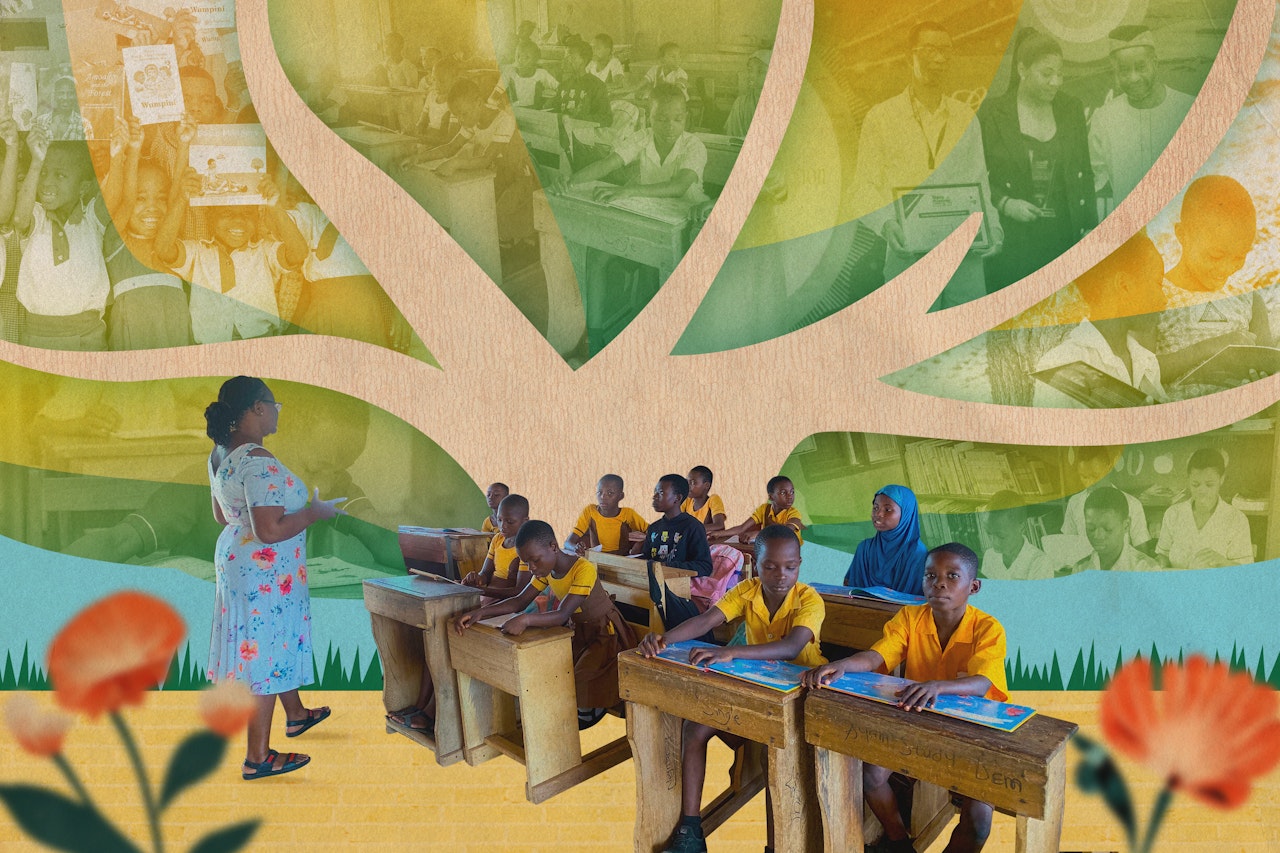Ghana
Olinga Foundation fosters literacy with moral purpose
Olinga Foundation pairs reading lessons with moral principles, addressing literacy needs in rural communities in Ghana over the past 25 years.

Olinga Foundation pairs reading lessons with moral principles, addressing literacy needs in rural communities in Ghana over the past 25 years.

ACCRA, Ghana — In a classroom, a girl stands before her peers and reads aloud from a slim booklet of stories on honesty and kindness, her face illuminated with newfound assurance. Only a few months earlier she hesitated over the alphabet; now her steady voice draws smiles from classmates who follow every line. Her achievement represents not just a personal milestone—it is a quiet signal that whole families and neighborhoods can change when learning is joined to moral purpose.
Scenes such as this unfold daily in the many classrooms where the Olinga Foundation for Human Development—a Bahá’í-inspired educational endeavor—operates and partners with schools in their literacy programs, reaching 400,000 learners and 45,000 teachers across 250 rural communities in Ghana over its 25-year history.
“In the mid-1990s, as Baháʼí community-building activities drew neighbors of all ages into closer conversation and study, it became clear that many could not yet read with ease,” recalls Leonard Nubuasah, the Foundation’s national coordinator, in a conversation with the News Service.
Recognizing that limited literacy could hold back both personal growth and collective endeavor, local educators resolved to address the gap head-on. “The Bahá’í teachings describe the education of children as one of the most meritorious deeds,” Mr. Nubuasah explains. “Inspired by that vision, several people arose to help address illiteracy.”
Linking reading instruction with the cultivation of moral and spiritual qualities has since drawn wider appreciation. In 2024 the Olinga Foundation received a Ghana Philanthropy Award for “Inspiring Literacy Change”—recognition, educators say, that belongs to the many teachers and families who have made the program their own.
“Education,” says Leslie Casely-Hayford, director of the Olinga Foundation, “is not only necessary for individual progress; it is essential to a society’s capacity to prosper.”
Dr. Casely-Hayford points to Bahá’u’lláh’s assertion that knowledge is “as wings to man’s life” and she added: “A society that does not address literacy diminishes its creative energy and hinders its ability to meet every other challenge—from upholding the equality of women and men to improving food security and climate resilience.”
“A society that does not address literacy diminishes its creative energy and hinders its ability to meet every other challenge—from upholding the equality of women and men to improving food security and climate resilience.”
Leslie Casely-Hayford, Director of the Olinga Foundation
Weaving lessons with principles
As with many Bahá’í-inspired organizations, the Foundation’s literacy work strives to weave the development of technical skills with moral purpose.
Lessons are organized around a principle—humility, truthfulness, justice—inviting pupils to consider how that principle might guide their choices at home, at school, or in the broader community.
Teachers then help the class turn reading comprehension into discussion, reflection, and small acts of service.
The Foundation’s programs place special emphasis on the advancement of women. “We invite both head-teachers and classroom teachers to examine their own practice,” explains one of the organization’s facilitators, “to ensure that classes adopt routines that draw every child—girl or boy—into the heart of the lesson.”
The results are striking. “When a girl who once sat silent begins to read aloud, her confidence lifts the whole room,” observed Mr. Nubuasah. That self-assurance, staff say, appears well beyond the classroom: girls acquire and share knowledge about improved health and hygiene practices and make informed choices about their futures—changes that radiate outward to family well-being, including lower infant mortality rates later in life when they become mothers.
“Literacy enlarges a young person’s horizon,” added Dr. Casely-Hayford. “A girl who can read widely starts to picture herself as a contributor to her community. That clearer sense of identity and purpose is one of the surest protections against pressures such as early pregnancy.”
Strengthening foundations for prosperity
“Literacy is a doorway, but what matters most is what children carry through that doorway—the capacity to consult, to serve, to build unity wherever they go.”
Leonard Nubuasah, National Coordinator of the Olinga Foundation
Within nine months of a school adopting the program, the proportion of pupils reading with fluency typically climbs from about one-quarter to well over half.
“When parents see their daughter or son reading aloud, hope returns,” explained Dr. Casely-Hayford.
“Families that might have withdrawn support by junior high school begin cheering their children on, and their community feels the lift,” she said.
Mr. Nubuasah, reflecting on the journey of students, teachers, and communities, stated: “Literacy is a doorway, but what matters most is what children carry through that doorway—the capacity to consult, to serve, to build unity wherever they go.”